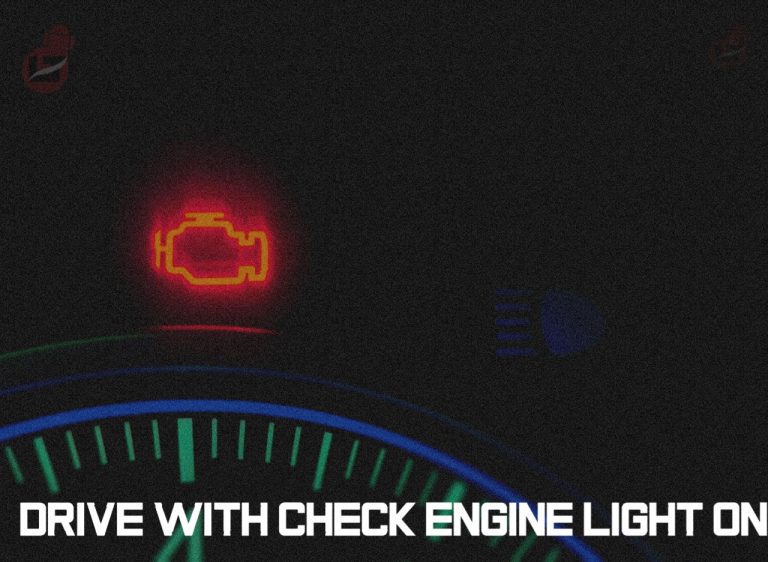Check engine light is an advanced technology in modern vehicles that displays warning lights to inform the driver of minor or major system failures.
Minor in the sense that those faults aren’t crucial and can be attended to some other time; meanwhile, a significant problem will require the driver to stop immediately or even stop the car because of the impact.
It’s essential to understand all warnings on your dashboard and know which action to take as provided in your car user manual.
Therefore, the question “How long can you drive with Check Engine Light ON” depends on the severity of the impact caused by the failure of your vehicle.
In this article, you’ll learn the check engine light, how to diagnose the error code, and how long you can drive with the check engine light on.
Check Engine Light ON – Meaning
The check Engine light, sometimes known as the Malfunction Indicator Light (MIL), is a warning light that illuminates whenever the Engine Control Module detects a problem (ECU). Most of a modern car’s functionality depends on sensors and actuators that monitor and enhance engine performance.
The ECU is coupled to these sensors and controllers. The manufacturer pre-programs the car’s ECU with specific values. The check engine light turns on to alert the driver that something is off when the ECU detects an erroneous (high/low) number.
Although, the check engine light turns on when you Ignite your car and goes off after some time if it doesn’t find any error.
However, if the check engine light remains ignited, you should check for signs such as stalling, unusual sounds, or fuel consumption.
The ECU, in turn, stores a diagnostic troubleshooting error code that can now be read using a diagnostic scanner.
The On-Board Diagnostics (OBD2) port, typically found under the steering wheel, is where the scanner is attached to the vehicle. The mechanic can identify which sensor or actuator is causing the car to malfunction by scanning the vehicle with a diagnostic instrument.
Some of the common reasons why the check engine light usually turns on include the following;
- An issue with the spark plugs
- An ignition coil error
- A problematic Mass Airflow Sensor
- A defective oxygen sensor
- A faulty fuel injector etc.
You can visit our error codes page to check out possible codes that might be stored by the OBD-II scanner and how to fix them.
How Long Can I Drive with Check Engine Light On?
As discussed earlier, This question’s response is a little unclear. Everything relies on the severity of the trouble that caused the light to turn on; before deciding whether you can drive with the engine warning light on, you need to perform some inspections.
You can check out for indications from all indicator lights. Please turn OFF the vehicle and turn it back on while observing its response.
Furthermore, you can reduce the car’s speed and remove any heavy load from the vehicle. If the check engine light is illuminated immediately after refilling, the fuel cap should be thoroughly tightened, etc.
However, if the check engine light turns on without affecting your vehicle’s performance, it’s safe to continue driving, but you must take the car to a mechanic to resolve the issue.
In addition, the disconnection between the wiring harness between the engine control module and the sensors might have been tampered with, thereby leaving the light turned on.
Check Engine Light ON – How to Diagnose and Fix
Let me give you a brief guide on how you can decipher why your check engine light is illuminated and how to fix the issue.
You’ll need to purchase a diagnostic tool, also known as the OBD-II scanner, from Amazon (If you’re willing to do it on your own). We recommend the FOXWELL Car Scanner NT604 Elite OBD2 Scanner.
- Connect the OBD-II scan tool to your car’s OBD-II port after purchasing it (the port is located beneath the dashboard’s lower border on the driver’s side)
- To prevent bending any device pins, take caution when attaching the device.
- Turn the key to the “ON” option but leave the engine off
- The scanning tool may read the recorded codes from the ECU memory and flash a few LEDs.
- Now, from the menu, choose read codes and take note of the codes that come up on the screen, for example, P0123.
You can now perform a Google search to know how to resolve it. (You can also check our error codes page)
You can restart the car and see if the check engine light will be turned off and the error code will be cleared.
If you’ve done this and the lamp is still on, identify the broken part, fix it, or replace it as quickly as you can. This is because the fault may reduce engine power and result in odd noises and vibrations. Additionally, it makes the car’s emissions worse. The head gasket may eventually blow if specific complex components, such as the catalytic converter, are not fixed.
Summary
Every car owner must watch the check engine light to decipher when there’s a possible fault in the car system.
A diagnostic scanner will increase your chances of resolving the issue and returning your car to default.
Also, while some codes will require immediate attention, others will not, and some error codes will clear off themselves.
Whatever the case, perform a routine check on your vehicle to prevent the emergency check engine light from turning ON.
As an Amazon Service LLC Program Associate, V. Auto Basics earns from qualifying purchases. See Our Affiliate disclaimer.
